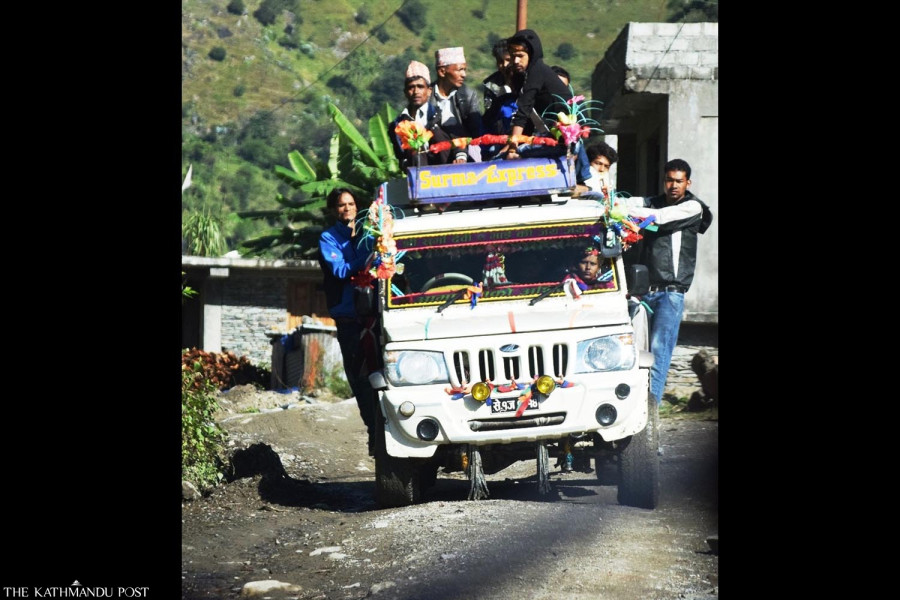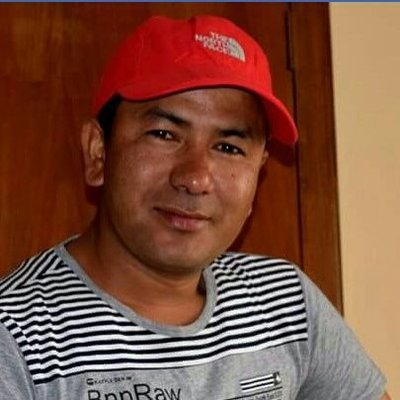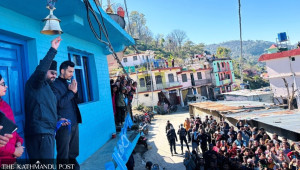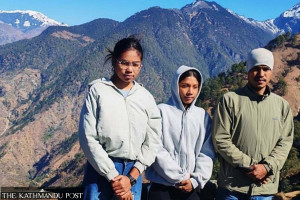Sudurpaschim Province
Poorly built roads turn into death traps in Far West hills
19 people died and 30 others were injured in seven road accidents in Masta Rural Municipality in past three years.
Basant Pratap Singh & DR Pant
On October 19 last year, a passenger jeep heading towards Masta Rural Municipality from Chainpur, Bajhang’s district headquarters, swerved off the road at Chyur in Jayaprithvi Municipality.
Eight people died and 17 others were injured in the crash.
This was the second biggest traffic accident in Bajhang, a hill district of Sudurpaschim Province, since 2019 when 10 people died and five others were injured in a jeep accident. Both accidents occurred in the same stretch of the rural road linking Pankot of Jayaprithvi with Bhusya of Masta. The 14km road track was opened in 2015.
Both accidents occurred owing to the poor condition of the road and overloading.
“The road section is narrow and quite steep. Moreover, both vehicles were carrying passengers far beyond their capacity,” said Deputy Superintendent of Police Jageshwar Bhandari, chief at the District Police Office in Bajhang.
In the October crash, according to police, the six-seater jeep was carrying 25 passengers and around four quintals of goods. The jeep had a private number plate which means it wasn’t allowed to carry passengers or goods.
The local traders at Dungri in Chainpur, the district headquarters of Bajhang, where private jeeps and public vehicles station, say the security personnel deployed in the area did not stop the driver from overloading the jeep.
“The jeep kept passengers and goods beyond its capacity in front of the security personnel. The police didn’t stop the jeep driver from doing so,” said a trader, requesting anonymity. “The fatal accident in October could have been averted if the security personnel had stopped the driver from overloading his vehicle.”
The driver survived the accident and is in judicial custody awaiting trial, said police inspector Ramesh Awasthi, spokesperson for the District Police Office, Bajhang.
However, it is not only in Dhungri where private vehicles operate as public vehicles and goods carriers. The locals claim that the police are well aware of this malpractice but had done little to stop it.
“The security personnel turn a blind eye to such malpractice which poses a great risk to the lives of passengers and even the driver,” said Janak Singh, a local resident. “The police must have something to gain from the ‘arrangement’ the jeep owners and the drivers have made with them.”
Chief District Officer Baburam Aryal, who also chairs the district transportation management committee, claimed that he had instructed the police to take strong action against vehicles flouting legal provisions—carrying passengers beyond capacity and charging hefty fares. “But the police alone cannot control such a problem. Passengers, transport entrepreneurs and the local government should also be aware,” said Aryal.

More often than not, the poor condition of roads is the leading cause of fatal accidents. The Pankot-Bhusya road, where two big accidents in the past three years occurred, is in a dilapidated condition.
The track was opened in 2015 even without carrying out an engineering survey. Kalak Khadka, the chairman of the local consumer committee, admitted that the road had been constructed without conducting an engineering survey which has led to shoddy construction.
The track from Pankot to Bhuwadhuska via Dugrakot had been constructed in 2015 by forming a consumer committee. The road was constructed by using heavy machinery at a cost of Rs4 million provided by the then District Coordination Committee and then Kotdebal VDC.
The road stretch from Daudi-Dugrakot inside the Pankot-Bhuwadhuska road stretch had seven sharp bends along the steep roads. Two years later another road was constructed by changing the alignment at the cost of Rs 9.2 million funded by Masta Rural Municipality.
The narrow and steep road was not upgraded properly even after the fatal jeep crash of 2017 that claimed 10 lives. As a result, another big accident happened last October.
“Almost all the road sections in Masta Rural Municipality are in poor condition. In some road sections, the gradient (slope) should be lowered to 3-4 metres in some places,” said Gyan Bahadur Bohara, the chairman of Masta Rural Municipality. He; however, says the rural municipality does not have the required budget or the human resource to upgrade the roads.
According to the data available at Masta Rural Municipality, a total of 19 people died and 30 others sustained injuries in seven different road accidents in Masta alone in the past three years.
Similarly, the Daiji-Jogbudha road, which aims to connect the hilly areas of the Sudurpaschim Province to the Tarai region across the country, is in dire straits. The construction of the 31km-long road section commenced around 38 years ago to connect Daiji of Kanchanpur district to Jogbudha of Dadeldhura district.
The 21km-long Daiji-Naula was opened in 2000. Eleven people had died in a jeep accident at Lipana section along the Daiji-Naula stretch in 2001. Immediately after the accident, the local administration imposed a ban on using the track until the time it was upgraded. However, vehicles started plying the road section when the road was extended to Jogbudha in 2009 without an upgrade.
“The approximately 19km-long road of the Daiji-Jogbudha section is very risky. We call it the death road,” said Hari Dhami, a jeep driver. “We hear that a budget is allocated for road upgrade every year but the condition of the road remains the same.”
The Daiji-Jogbudha is the shortest route to connect about half of the areas of Dadeldhura and Baitadi districts to Tarai. According to the District Traffic Police Office in Dadeldhura, around two dozen vehicles run along the road section on a daily basis. But the road is in a sorry state. “It takes 4-5 hours to cover just one km distance. The road becomes unmotorable during the rainy season,” said Dhami.
According to Kailash Pandey, a local of Dadeldhura, the government, municipality, then VDC and the World Food Programme provided around Rs670 million to the road project between 1991 and 2011. More than Rs1 billion had been spent by different agencies since 2009.
“The federal government had awarded a contract of Rs530 million to upgrade the Daiji-Jogbudha road in the fiscal year 2018-19. Around Rs350 million was allocated by the provincial government after the road project came under it,” said Pandey.




 10.12°C Kathmandu
10.12°C Kathmandu
















